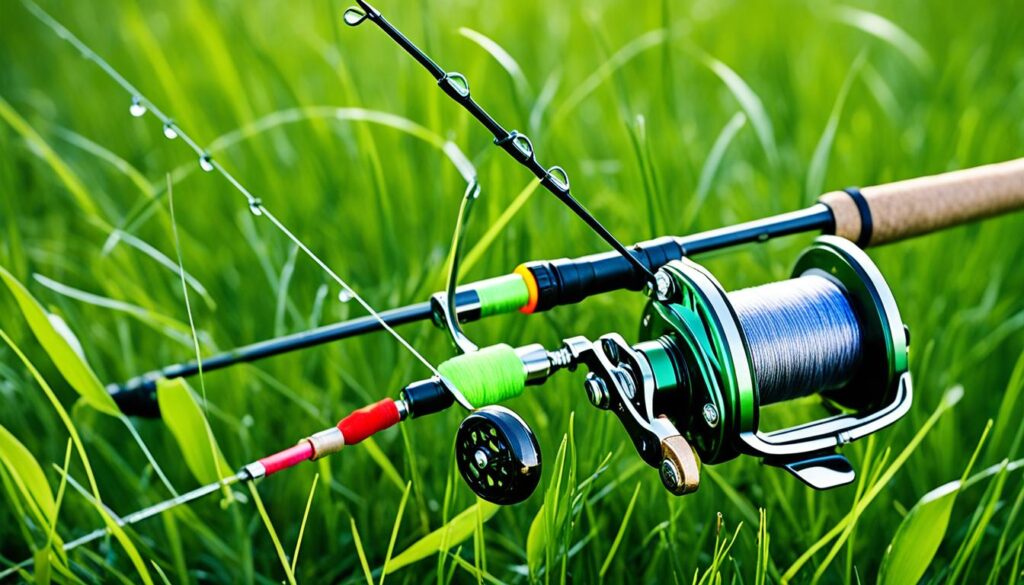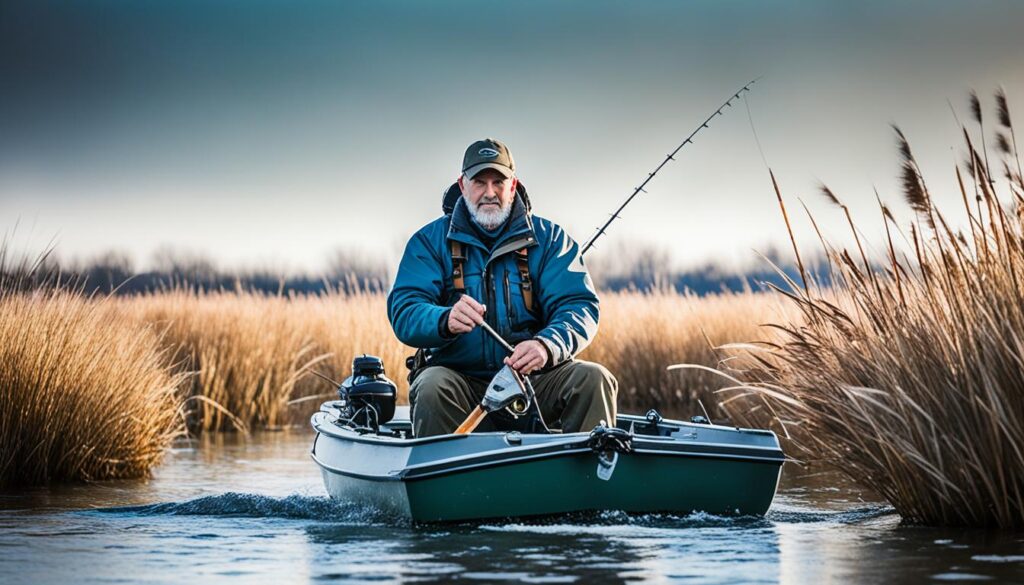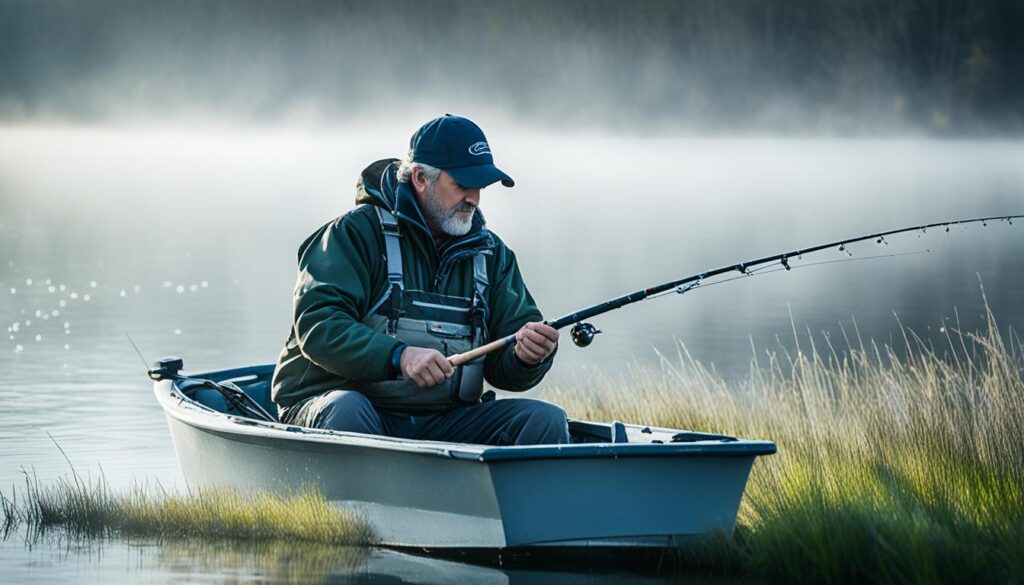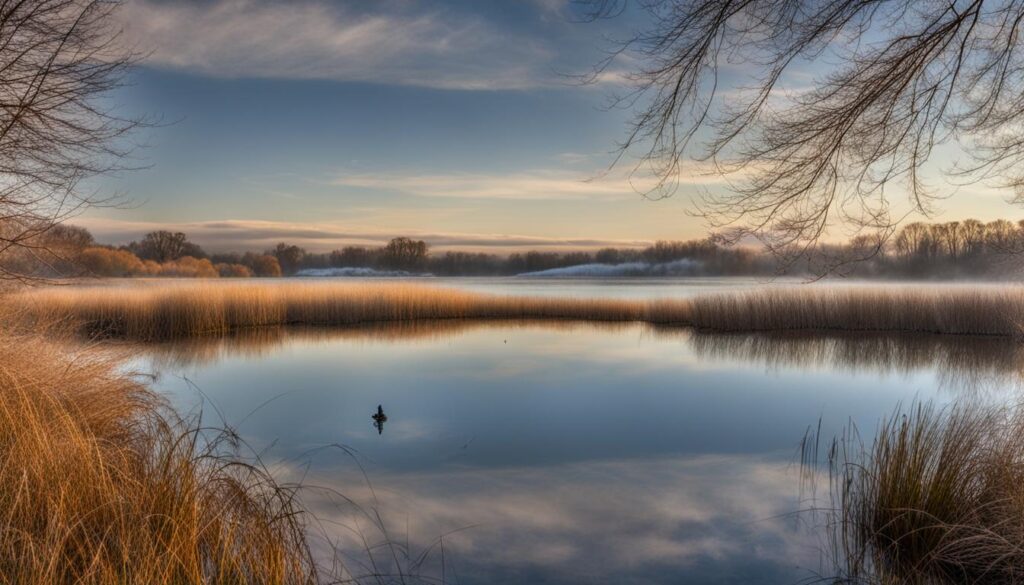Winter bass fishing presents a unique set of challenges for anglers, but armed with the right tactics and gear, it can also be gratifying. Among the arsenal of lures, jerkbaits are a go-to choice for enticing bites even in the coldest waters. This article will delve into the art of jerkbait fishing for winter bass, specifically in the renowned Grass Lakes.
Angler’s Essentials:
- Jerkbaits are highly effective in winter bass fishing in Grass Lakes.
- Choose slow-sinking or suspending jerkbaits for cold water conditions.
- Use a medium-power casting rod and fluorocarbon line for jerkbait fishing.
- Vary your retrieve speed and cadence to attract sluggish bass.
- Experiment with other baits and understand bass behavior in Grass Lakes during winter.
The Importance of Jerkbaits in Winter Bass Fishing
Winter bass fishing presents a unique set of challenges for anglers, but armed with the right tactics and gear, it can also be gratifying. Among the arsenal of lures, jerkbaits are a go-to choice for enticing bites even in the coldest waters. This article will delve into the art of jerkbait fishing for winter bass, specifically in the renowned Grass Lake.
Choosing the Right Jerkbait for Winter Bass
In winter bass fishing, the choice of jerkbait becomes paramount. Opting for models with a slow-sinking or suspending action can significantly elevate your chances of enticing strikes from sluggish bass. These types of jerkbaits possess the crucial ability to linger in the strike zone, mimicking the movements of injured prey and triggering the predatory instincts of even the most cautious fish.
Among the options available, two jerkbaits have emerged as stalwarts pursuing cold water bass: the Rapala Shadow Rap Deep and the Megabass 110+1. Praised by seasoned anglers and backed by a track record of success, these lures have earned their place in the tackle box of many winter fishing enthusiasts. Their lifelike appearance and captivating swimming action make them irresistible temptations for largemouth bass prowling the depths of Grass Lakes during the frosty months.
| Jerkbait | Description | Target Species |
|---|---|---|
| Rapala Shadow Rap Deep | A slow-sinking jerkbait with lifelike action | Smallmouth Bass, Largemouth Bass |
| Megabass 110+1 | A suspending jerkbait with erratic darting movements | Smallmouth Bass, Largemouth Bass |
Tackle and Gear for Jerkbait Fishing in Grass Lakes
To navigate the waters of Grass Lakes during the winter bass fishing season with jerkbaits, having the correct tackle and gear is paramount. Here’s a comprehensive breakdown of the essential equipment you’ll need to ensure a successful outing:
Casting Rod: For jerkbait fishing, opt for a medium-power casting rod with a soft tip. This specific rod type is engineered to prevent the bait from slapping the water too aggressively during retrieval, thereby maintaining a more natural presentation. Its sensitivity and flexibility are vital for effectively maneuvering jerkbaits and detecting subtle strikes from winter bass lurking beneath the icy surface.
Fluorocarbon Line: In the 8-12lb range, the fluorocarbon line reigns supreme for winter bass fishing with jerkbaits. Renowned for its low visibility and enhanced sensitivity, the fluorocarbon line is the perfect companion for detecting the faintest bites and enticing more strikes from wary bass. Its abrasion resistance also proves invaluable when navigating potential underwater obstacles, ensuring your line remains intact during intense battles with trophy fish.
Lightweight Reel: Combatting fatigue is essential during extended jerkbait fishing sessions, mainly when targeting winter bass in Grass Lakes. Opt for a lightweight reel such as the Lew’s Pro Magnesium Speed Spool or Shimano Aldebaran MGL to minimize strain on your wrist and arm muscles. By reducing physical exertion, these reels allow you to maintain focus on your technique, maximizing your chances of landing that prized winter bass.
With the right combination of tackle and gear, you’ll be well-equipped to tackle the challenges of winter bass fishing with jerkbaits in Grass Lakes, increasing your odds of a memorable angling experience.
Tackle and Gear Summary
| Tackle/Gear | Features |
|---|---|
| Casting Rod | Medium-power with a soft tip for a natural retrieve |
| Fluorocarbon Line | 8-12lb range for low visibility and enhanced sensitivity |
| Lightweight Reel | Lew’s Pro Magnesium Speed Spool or Shimano Aldebaran MGL for reduced fatigue |

Techniques for Fishing Jerkbaits in Winter Bass
Mastering jerkbait techniques is vital for winter bass fishing in Grass Lakes. Adjust retrieve speed and experiment with pauses to mimic dying baitfish. Target bass near structures like rock piles for ambush points.
| Techniques for Fishing Jerkbaits in Winter Bass | Benefits |
|---|---|
| Vary retrieve speed and cadence | Triggers reaction strikes from sluggish bass |
| Experiment with pauses and jerking speeds | Imitates injured prey and entices strikes |
| Fish near structure or areas where bass are holding | Increases chances of targeting active bass |
Other Effective Baits for Winter Bass in Grass Lakes
While jerkbaits remain a reliable choice for winter bass in Grass Lakes, other baits can also prove effective. Blade baits, lipless crankbaits, wacky worms, and jigs offer diverse options for enticing coldwater bass. Experimentation is crucial to match the bait to the conditions and bass behavior.
Blade baits provide versatility, vibrating action, and subtle movement, ideal for various depths. Lipless crankbaits, with their loud rattles and fast retrieve, attract bass from afar and cover expansive water areas. Wacky Worm Rigs excel in finesse, with a slow, enticing fall miming easy prey for sluggish bass. Jigs, a classic option, offer versatility in presentation, from slow drags to hop-and-pause techniques near structures.
In winter bass fishing, adaptability and trying different baits are key. You can just experiment with presentations to find what resonates best with the conditions and bass temperament in Grass Lakes.

Understanding Bass Behavior in Grass Lakes during Winter
Understanding the behavior of winter bass in Grass Lakes is pivotal for successful fishing expeditions during this chilly season. These bass exhibit sluggishness and reduced activity levels in cold water, emphasizing the need for slow and subtle presentations to provoke strikes. Often, they’ll cling close to structures like submerged rocks or brush piles, conserving energy and minimizing movement.
To capitalize on these behaviors, anglers must exercise patience and precision. Adapting fishing techniques to match the winter behavior of Grass Lakes bass is crucial. You can just go for a slow retrieve speed, incorporating gentle twitches or pauses to enhance the allure of your bait. Experimentation with different speeds and cadences can reveal the most effective approach on any given day.
Selecting prime fishing spots is equally critical. I’d like you to focus on areas where bass seeks cover and ambush opportunities. Targeting rock piles, submerged boulders, or brush piles heightens the likelihood of encountering actively feeding winter bass.
In summary, comprehending the nuances of bass behavior in Grass Lakes during winter sets the stage for a rewarding fishing excursion. Observe their movements, experiment with various techniques, and tailor your strategy accordingly. With perseverance and adaptation, you’ll soon reel in trophy-sized winter bass from the depths of Grass Lakes.

Tips for Coldwater Bass Fishing in Grass Lakes
When targeting winter bass in Grass Lakes, consider a few additional tips for success. Firstly, note water clarity and adjust your lure selection accordingly. In clearer waters, opt for natural baitfish colors, while in stained waters, brighter or more contrasting colors can effectively attract bass.
Secondly, focus your efforts during the warmest parts of the day when water temperatures are slightly higher and bass are more likely to be active. Given their tendency to be sluggish in cold water, maximizing fishing time during these periods can significantly increase your success rate.
Lastly, could you prioritize catch and release practices to help save the bass population in Grass Lakes? By releasing bass, you contribute to their growth and reproduction, ensuring a sustainable fishery for future generations. Responsible angling fosters the preservation of this beautiful ecosystem.
In essence, winter bass fishing in Grass Lakes offers a rewarding experience. Adhering to these tips and employing effective winter fishing techniques can elevate your chances of landing trophy bass even in the coldest conditions.
Conclusion
Grass Lakes offers an exceptional destination for fishing enthusiasts seeking a rewarding winter experience. Employing the foolproof strategy of jerkbaits, anglers can effectively target smallmouth and largemouth bass in cold water conditions. Success hinges on selecting the right jerkbaits, utilizing appropriate tackle and gear, and understanding bass behavior in Grass Lakes during winter.
Experimentation with different retrieve techniques and considering alternative baits for winter bass fishing can further enhance one’s chances of landing big catches. Whether relishing the solitude of winter fishing or seeking the thrill of reeling in prized bass, Grass Lakes provides an ideal setting for enthusiasts.
Though winter poses challenges, rewards are plentiful with the right strategies and lures. Embrace the serenity of Grass Lakes and embark on a successful winter bass fishing adventure.
FAQ
What is the best strategy for winter bass fishing in Grass Lakes?
The foolproof strategy for winter bass fishing in Grass Lakes is to use jerkbaits. These lures mimic the erratic movements of dying baitfish, attracting hungry bass and triggering a reaction strike.
What are the recommended jerkbaits for winter bass fishing?
Popular jerkbaits for winter bass fishing in Grass Lakes include the Rapala Shadow Rap Deep and Megabass 110+1. These lures have a slow-sinking or suspending action, allowing them to stay in the strike zone longer.
What tackle and gear should I use for jerkbait fishing in Grass Lakes?
It is recommended to use a medium-power casting rod with a soft tip, fluorocarbon line in the 8-12lb range, and a lightweight reel such as the Lew’s Pro Magnesium Speed Spool or Shimano Aldebaran MGL.
How should I vary my retrieve when fishing with jerkbaits in Grass Lakes?
In cold water conditions, bass are often sluggish, so it’s important to experiment with different retrieve speeds and cadences. A nearly motionless lure can often draw a strike, but varying pauses and jerking speeds can also be effective.
Are there other baits that can be effective for winter bass fishing in Grass Lakes?
Yes, blade baits, lipless crankbaits, wacky worms, and jigs are all popular choices for targeting coldwater bass in Grass Lakes. Each bait has its own unique action and presentation that can trigger strikes from lethargic bass.
What should I consider about bass behavior in Grass Lakes during winter?
Bass tend to be more sluggish and less active in cold water, so presenting baits in a slow and subtle manner is often more effective. They may be holding near structure or areas like rock piles and submerged boulders.
What additional tips should I keep in mind for winter bass fishing in Grass Lakes?
Pay attention to water clarity and adjust lure selection accordingly. Focus your efforts during the warmest parts of the day when the water temperature may be slightly higher. Always practice catch and release to help preserve the bass population.
